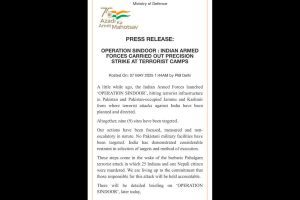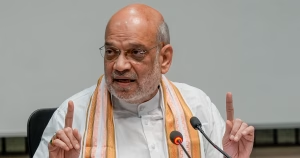New Delhi – In a decisive move against terrorism, Indian Armed Forces executed Operation Sindoor targeting terrorist facilities in Pakistan and Pakistan-occupied Jammu and Kashmir. The Operation Sindoor, planned with precision and intelligence coordination, involved aerial strikes and ground assaults on multiple high-value terrorist camps. Strategic targets included weapons depots, communication hubs, and militant training centers.
Reports indicate that several top terrorist operatives were neutralized, delivering a major blow to cross-border insurgent networks. This action underscores India’s firm stance on national security and its commitment to eradicating terrorism. The operation also sent a strong message to hostile elements operating with impunity across the border.
India Launches Operation Sindoor: A Measured Response to Terrorism

In a significant development in India’s counter-terrorism efforts, the Indian Armed Forces successfully carried out Operation Sindoor, a precision strike targeting terrorist infrastructure in Pakistan and Pakistan-occupied Jammu and Kashmir. The operation was conducted in response to the recent deadly terrorist attack in Pahalgam that claimed the lives of 25 Indian citizens and one Nepali national.
The strikes were carried out “across the international border” on Muridke and Bahawalpur – both in Punjab province – and across the Line of Control on Kotli and Muzaffarabad in PoK, the foreign ministry statement said.
Muridke, located a short distance from Lahore, is home to a sprawling “markaz” or base of Lashkar-e-Taiba (LeT), while Bahawalpur is the main stronghold of the Jaish-e-Mohammed (JeM). Kotli and Muzaffarabad are regions in PoK where both LeT and JeM have for long had camps and training facilities, people familiar with the matter said on condition of anonymity. The strikes targeted terrorist launch pads located two to six kilometres from the LoC and terrorist camps eight to 16 kilometres behind the launch pads, the people said.
Also Read: New Criminal Laws in Delhi: Shah Demands Higher Conviction Rates
The Scope of Operation Sindoor
Operation Sindoor involved coordinated strikes on nine distinct terrorist sites identified as planning and operational hubs for attacks against India. Intelligence sources indicate that these facilities were actively involved in training, arming, and directing terrorist operatives for infiltration into Indian territory.
“Operation Sindoor was executed with surgical precision,” stated a senior defense official who requested anonymity. “Our forces targeted specific terrorist infrastructure that posed imminent threats to our national security. Every target was carefully selected based on concrete intelligence about terrorist activities.”


The operation utilized advanced technology and weaponry to ensure maximum effectiveness while minimizing collateral damage. Military analysts note that Operation Sindoor demonstrates India’s enhanced capabilities in conducting targeted counter-terrorism operations across challenging terrain.
Measured Response: The Strategic Significance of Operation Sindoor
Defense experts emphasize that Operation Sindoor represents a calculated and proportionate response to terrorist provocations. By explicitly avoiding Pakistani military facilities, India has signaled its intention to target terrorism specifically rather than escalate into a broader military confrontation.
“Through Operation Sindoor, India has demonstrated remarkable restraint and strategic maturity,” explains Dr. Rajesh Kumar, a defense and strategic affairs analyst. “This operation sends a clear message that India will not tolerate terrorist attacks against its citizens but has no interest in military escalation with Pakistan as a state.”
The targeted nature of Operation Sindoor reflects India’s evolving counter-terrorism doctrine, which increasingly emphasizes precision strikes against specific terrorist infrastructure rather than broader military actions. This approach allows India to address immediate security threats while maintaining diplomatic channels for potential de-escalation.
Operation Sindoor: A Response to the Pahalgam Attack
Operation Sindoor comes in direct response to the heinous terrorist attack in Pahalgam, where 26 innocent lives were lost in what officials have described as a “barbaric act of terrorism.” The Pahalgam attack, which targeted civilians, shocked the nation and prompted calls for a decisive response against terrorist organizations operating from across the border.

“The Pahalgam attack was a grim reminder of the persistent threat of cross-border terrorism,” stated a senior government official. “Operation Sindoor fulfills our promise to the Indian people that those responsible for such acts will face consequences.”


Intelligence reports suggest that the Pahalgam attack was planned and directed from some of the very facilities targeted in Operation Sindoor. By striking these bases, India aims to disrupt the operational capabilities of terrorist groups and prevent future attacks on Indian soil.
International Reactions to Operation Sindoor
The international community has closely monitored Operation Sindoor, with varied responses from global powers. Several countries have acknowledged India’s right to self-defense against terrorism while urging restraint to prevent regional escalation.
“Operation Sindoor has been conducted within the parameters of international law regarding self-defense against terrorist threats,” notes international law expert Professor Sarah Richardson. “India’s careful approach in targeting only terrorist infrastructure demonstrates compliance with principles of necessity and proportionality.”
Regional security experts believe that Operation Sindoor represents a significant development in South Asian security dynamics. The operation demonstrates India’s willingness to take direct action against terrorist threats while maintaining a measured approach that offers pathways for diplomatic resolution.
The Technology Behind Operation Sindoor
Military technology experts have highlighted the sophisticated capabilities displayed during the Operation. The precision strikes required advanced intelligence gathering, secure communications, and precision-guided munitions to achieve their objectives with minimal collateral damage.
“Operation Sindoor showcases India’s growing technological capabilities in conducting complex counter-terrorism operations,” explains defense technology analyst Vikram Mehta. “The successful execution of strikes across nine separate locations demonstrates significant advancements in India’s intelligence-gathering and operational coordination.”
Reports indicate that Operation Sindoor utilized a combination of aerial assets and special forces to achieve its objectives. The integration of these capabilities represents a new chapter in India’s counter-terrorism approach, emphasizing intelligence-led operations with minimal footprint.
Looking Ahead: The Impact of Operation Sindoor
Security analysts suggest that this Operation will have significant implications for regional security dynamics. By demonstrating both the will and capability to conduct precision strikes against terrorist infrastructure, India has established a new threshold for its response to terrorist provocations.
“Operation Sindoor effectively communicates India’s red lines regarding terrorism,” observes strategic affairs commentator Dr. Meena Sharma. “This operation establishes that India possesses both the intelligence capabilities to identify terrorist infrastructure and the military means to neutralize these threats with precision.”
Government sources indicate that Operation represents part of a broader counter-terrorism strategy that combines diplomatic pressure, intelligence operations, and, when necessary, direct military action against terrorist threats. This comprehensive approach aims to address the immediate security challenges while working toward long-term regional stability.
Final Word: Operation Sindoor Marks a New Phase in Counter-Terrorism

As the dust settles following Operation, it is clear that this operation represents a significant milestone in India’s counter-terrorism efforts. By conducting a focused, non-escalatory operation targeting specific terrorist infrastructure, India has demonstrated a mature approach to addressing security threats.
This Operation underscores India’s commitment to protecting its citizens while maintaining regional stability. The measured nature of the response, focusing exclusively on terrorist facilities while avoiding military installations, reflects India’s strategic restraint even when confronted with provocative terrorist attacks.
As more details about Operation emerge in the coming days, the full impact of this operation on regional security dynamics will become clearer. What remains certain is that through Operation, India has sent a resolute message about its determination to combat terrorism in all its forms.

